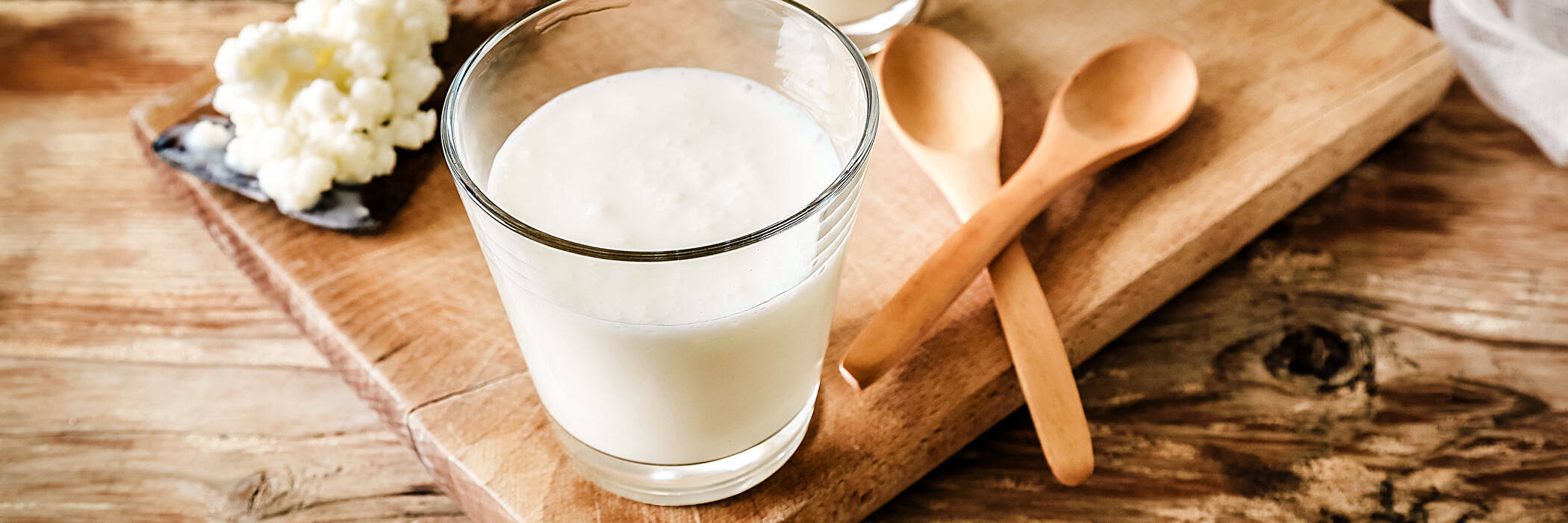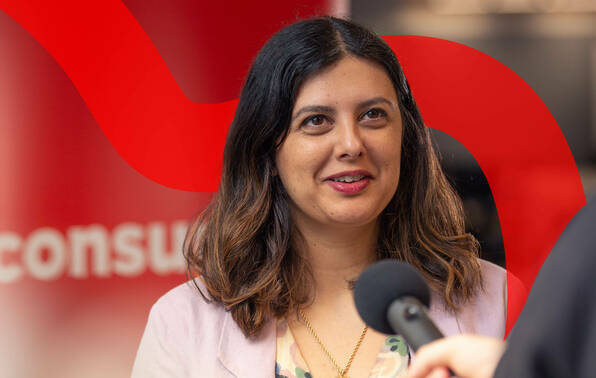
Four food fads to question
"Collagen-infused drinks". "Grass-fed beef". We lift the lid on the latest claims.

Collagen-infused drinks and immunity-boosting juices are among the latest products food marketers want us to put into our trolleys. We look behind the claims and explain what you need to know if you’re thinking about taking the bait.
Collagen claims
You’ll find collagen in a growing number of foods, everything from snack bars to collagen-infused water and coffee creamers. Celebrity Khloé Kardashian claims that Dose & Co collagen creamers deliver a glow “unlike anything else”.
But is eating pumped-up collagen products the pathway to a younger looking you?
Collagen is a protein made in your body and a key structural component of your skin, bones, tendons and ligaments. It’s continuously broken down and renewed. However, as you age, your body becomes less efficient at making it.
The collagen in processed food comes from bovine, porcine or marine sources. However, good evidence that adding this collagen to your diet provides any benefits is hard to find.
A 2019 review in the Journal of Cosmetic Dermatology found the few studies available suggested “there may be some benefits for the skin” associated with collagen supplements. However, the review found many studies had a limited pool of participants and the supplements used weren't comparable.
In addition, several studies were co-authored by employees of supplement manufacturers.
New Zealand Dermatological Society president Dr Louise Reiche said the claims for collagen foods and supplements are exaggerated and buying them is not good value for money.
“You don’t need to eat special collagen-containing foods to build up your collagen levels. It’s found naturally in animal products such as red meat, chicken and seafood. If you don’t eat animal products, your body can make collagen from healthy plant proteins,” Dr Reiche said.
The rest of your diet is also important. The body needs other nutrients, in particular vitamin C and copper to help make collagen. Fresh fruit and vegetables are high in vitamin C. Copper-rich foods include shellfish, nuts, seeds, organ meats and grains, she said.

Diet isn’t the only key to healthy-looking skin. “It’s important to protect your skin from damaging UV rays, stop smoking and get plenty of sleep,” she said.
Despite the lack of good evidence for collagen supplementation, we’ve found various health claims.
Adashiko Collagen Refresh Still Pure Artesian Water costs $5 for a 350ml bottle. Adashiko boasts this water has several benefits, including that it “supports joints, ligaments, and cartilage for greater mobility and flexibility”, “encourages recovery after sport, exercise, injury and surgery” and “promotes healthy digestion and heals the gut lining”.
The Ministry for Primary Industries (MPI) advised these claims breach the Food Standards Code (see “Making claims”). No health claims for collagen have been pre-approved under the code. After we contacted Adashiko, managing director Luci Firth said the company was unaware the claims were non-compliant and would contact MPI about the code’s requirements.
Collagen products
Along with their high price, collagen-infused products can be high in saturated fat or sugar.

Aussie Bodies Coconut Cream Delight Collagen Bar: $3.79 per bar
This protein bar claims to “help make your body shine from the inside out”. It contains nine percent saturated fat.
Dose & Co Dairy-Free Collagen Creamer Vanilla: $42.99 for 340g
Marketed as an addition to your coffee or smoothie, and endorsed by Khloé Kardashian, Dose & Co creamers claim to be “your daily dose of beauty and wellness”. The dairy-free version (made with coconut milk) contains a whopping 20.2 percent saturated fat.
No Ugly Skin Collagen + Enzogenol: $3.10 per 250ml bottle, $149 8-week supply.
To get the most out of No Ugly Skin, the company recommends you drink it regularly and sells an eight-week supply for $149. It's marketed as "skincare on superdrive", providing "collagen protein for tissue building and repair" and vitamin C that "contributes to collagen in skin".
The Food Standards Code allows manufacturers to claim vitamin C contributes to normal collagen formation if a product contains more than 10 percent of the recommended daily adult intake per serve. That’s why claims crop up on products like this that contain both collagen and vitamin C.
No Ugly’s website also links to a 2018 study on fish collagen peptides on skin aging signs in mature women. However, the study was funded by the manufacturer of the collagen supplements.
Tom & Luke Blendabombs Glow: $10 for 140g (5 x servings)
These Blendabombs with 12 percent bovine collagen promise to “superpower your smoothie”. They contain more than 40 percent sugar (from dates, which are the main ingredient).
Immunity-boosting claims

Immunity claims are also in vogue with food marketers. The Real McCoy Plus Immunity and Simply Squeezed Super Vege Immunity juices both claim to contain vitamin C for immune support (an approved health claim). Not so super is the more than three teaspoons of sugar (from fruit juice concentrate) in a 250ml glass.
Associate professor Rachael McLean, University of Otago public health and epidemiology senior lecturer, said you don’t need them.
“A healthy immune system can be supported by eating plenty of fruit and vegetables and healthy protein sources,” she said.
She also pointed out there are downsides to getting your nutrients from juice rather than whole foods. “Eating whole fruit gives you the benefit of other nutrients found in the skin and pulp, such as fibre. Fruit juices are often very concentrated, so you’ll consume the equivalent of many pieces of fruit in one go. Juices are also acidic, which can lead to dental erosion,” she said.
Food companies haven’t forgotten about kids either. Anchor ImmunoHalo is a fortified milk powder blend with a vanilla flavour. At $25 a can, it claims to “help support for your child’s immune system”. It includes prebiotics, probiotics, and 10 vitamins and minerals – along with glucose syrup solids and hydrogenated coconut oil.
“Milk drinks with a sweet flavour could displace foods that are part of a healthy diet. Drinking too much can also lead to excessive energy intake and increase the risk of becoming overweight,” University of Otago department of human nutrition associate professor Anne-Louise Heath said.
Fonterra, which owns the Anchor brand, said it has discontinued this product because it didn’t meet sales expectations. However, it’s still available at supermarkets.
Wellness claims
Drink brand No Ugly has a tonic for most ailments.

No Ugly Focus comes with “just about every brain-boosting ingredient under the sun”. The website claimed two ingredients in the drink – ginkgo biloba and panax ginseng – supported mental performance. When we asked the company to substantiate its brain-boosting claim, it said they were based on the tonic’s vitamin B3, B5 and B12 content and removed the claim relating to ginkgo biloba and panax ginseng.
We also asked the company to substantiate a claim for its No Ugly Sleep tonic. The website claimed this product was “full of magnesium which has been found to help regulate melatonin”. The company removed this claim after we questioned it.
Another product, No Ugly Detox, contains prickly pear cactus, which is “nectar of the gods to any liver trapped in an abusive relationship”. The product also contains choline to “help maintain normal liver function” (a claim approved in the Food Standards Code).
However, detox claims don’t stand up to scrutiny. Rob Walker, professor of medicine and renal specialist at Dunedin School of Medicine, said we don’t have to cleanse or detoxify because our bodies are well-equipped to handle what we eat.
“Detoxification occurs on a continual basis. The gut absorbs nutrients during digestion and these nutrients are transported to the liver, where further metabolism takes place. Both the gut and liver break down unwanted and potentially damaging compounds, which the kidneys eliminate,” Professor Walker said.
Grass-fed claims
Anchor Butter’s packaging states the spread comes from cows that “graze on lush pastures. Just as nature intended”. Grass-fed claims are also becoming the norm on meat packs from Kiwi brands. You can even buy cat food claiming to be made from grass-fed beef.
There are two main types of animal feeding systems – grass-fed (or pasture-fed) and grain-fed. Grain-fed systems conjure up images of animals crammed into grassless feedlots being grain-finished to maximise their weight, compared with idyllic images of grass-fed animals grazing on open fields.
In 2019, a New Zealand study published in the Journal of Agricultural Economics found that globally, consumers would pay an average 25 percent more for grass-fed dairy products, although this varies by country.
However, grass-fed claims don’t mean much if you’re purchasing New Zealand meat or dairy.
Beef + Lamb New Zealand general manager for market development Nick Beeby said approximately 98 percent of New Zealand beef and lamb is grass-fed.
“Only a very small proportion are grain-fed for finishing. That means they are grain-fed for around 30 to 50 days before slaughter to maximise weight. Occasionally, stock are grain-fed during drought or winter when paddocks are too wet.”
Internationally, there’s no standard definition of grass or pasture-fed. The Ministry for Primary Industries defines “pasture-fed” as animals that have been raised with year-round access to grass and any supplementary feeds don’t contain animal protein or animal fat, other than dairy.
Fonterra has developed its own Grass and Pasture Fed Standard. It requires cows supplying Fonterra’s milk have at least 80 percent of their diet as grass (calculated on a dry matter basis) and spend at least 90 percent of non-milking time outside on pasture. Certification agency AsureQuality also has a grass-fed logo, which companies can use on products.
Dr David Houlbrooke, AgResearch Innovation Centre of Excellence Leader for ethical agriculture, said there are advantages of grass feeding. “Grass-fed systems generally have similar or lower carbon footprints compared to feedlot systems, there is lower water use, and the animals have less welfare and health issues. There’s also evidence they have nutritional advantages such as a higher proportion of beneficial fats, and have different flavour and textures for some consumers,” he said.
Making claims
Nutrition and health claims are regulated by the Australia and New Zealand Food Standards Code.
Nutrition content claims are about the amount of certain nutrients or substances in a food, such as “good source of vitamin C”. These claims can be made even though a product may be high in sugar, saturated fat or sodium.
Health claims refer to a relationship between a food and health. There are two types of claims permitted:
- General-level health claims refer to a nutrient, substance or food and its effect on general health and wellbeing. For example, “vitamin C contributes to the reduction of tiredness and fatigue”.
- High-level health claims refer to a serious disease or a biomarker. For example, “diets high in calcium may reduce the risk of osteoporosis”.
There are more than 200 pre-approved general-level health claims and 13 pre-approved high-level health claims. Companies wanting to use a claim that isn’t pre-approved must notify Food Standards Australia New Zealand (or the Ministry for Primary Industries (MPI) if the product is a supplemented food). As part of the notification, the company must state it has evidence to substantiate the claim. MPI evaluates every notification by a New Zealand company.
Stay in the know
Keep up-to-date with Consumer's latest news, investigations and product and service reviews, plus join the Consumer panel with invitations to take part in surveys.
Thanks, you're now signed up. It's great to have you!

We can't do this without you.
Consumer NZ is independent and not-for-profit. We depend on the generous support of our members and donors to keep us fighting for a better deal for all New Zealanders. Donate today to support our work.



Member comments
Get access to comment